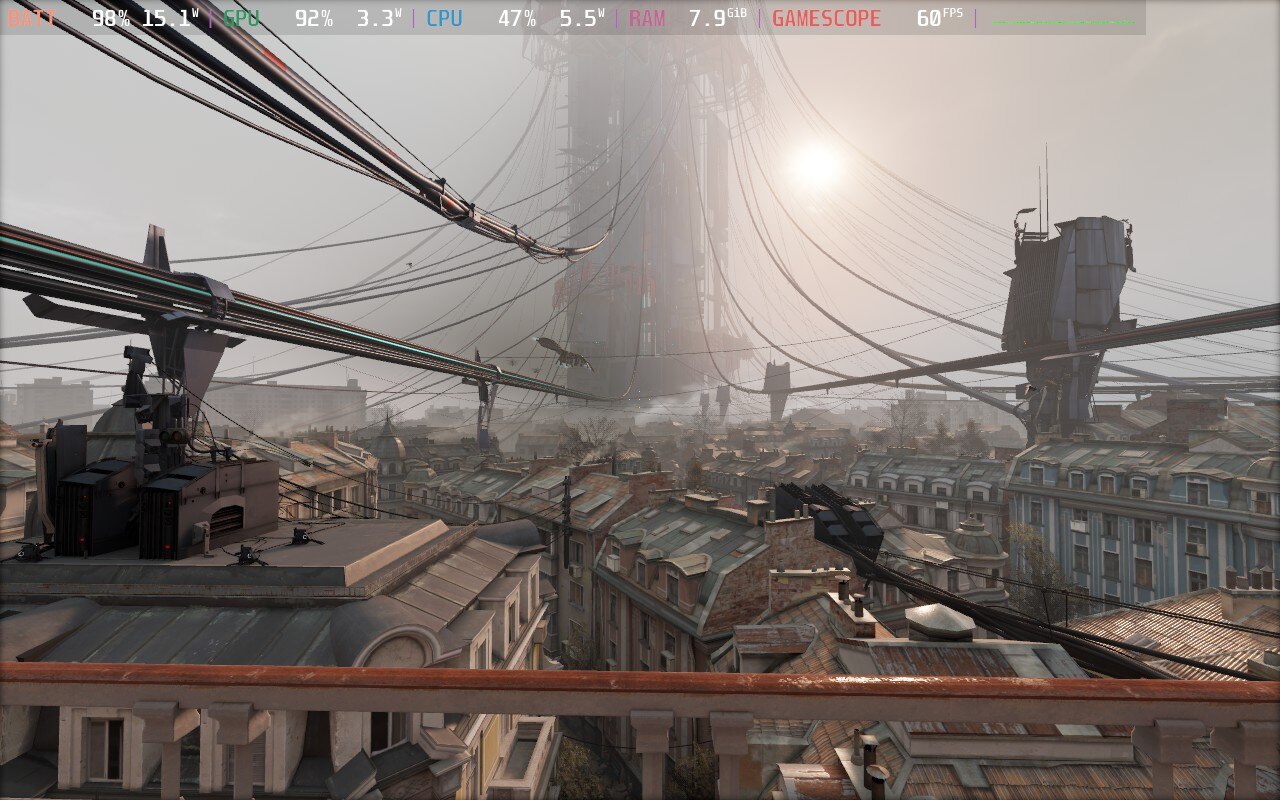There's been a few efforts to get Half-Life: Alyx playable without VR and the latest is HLA-NoVR, out now and it's now possible to play it through, even on Steam Deck too.
All you need to do is download it from GitHub or Mod DB, and place it into your Alyx install folder, overwriting the existing files and then set "-novr -vsync" as a launch option and yup — it works. The screenshot below is it running on my Fedora KDE desktop, with Proton 7.0-6 and MangoHud as well. I've only tested with Proton, as the Native Linux build hasn't work for me for some time now.
Speaking in an update on Mod DB the developers of the mod said: "This is our biggest update yet and we have no plans on slowing down! With thousands playing Half-Life Alyx NoVR we are happy to announce our largest update yet! As the titles state the entire game can now be played from start to finish, with the Gravity Gloves fully implemented along with combine fabricators providing weapon upgrades. Also since we are now updating the final parts of the game there may be spoilers! We will do our best to not spoil anything while ensuring we communicate these late game areas have been updated along with their gameplay mechanics."
They do still have a whole bunch of stuff left to do, but it's quite impressive what they've been able to achieve. You're also not currently able to get some of the Steam Achievements but it seems a lot of them are possible now (33/42). Even some popular mods for Alyx are playable with this including Levitation, Extra-Ordinary Value, Belomorskaya Station and Overcharge.
You can see in the shot below of Alyx running on my Steam Deck too, and there's even a Steam Input configuration ready for it and it felt quite playable.
Half-Life: Alyx in VR is one of my all-time favourite experiences, so it was thoroughly weird going through a little bit of it with this mod.
You can see some of their videos on YouTube full of spoilers of course.
True. But it's only been good for about 3-4 years. Also, mobile phones were around for decades before they caught on too.So, I've been thinking about this, and I don't think that comparison works in VR's favor. Cell phones are, fundamentally, about convenience: first the convenience of calling people without needing to be at a physical landline location, then later the conveniences that come with modern smartphones (texting, Internet access, apps, etc., although they were catching on years before the smartphone came around). But I think (the majority of) people could always recognize the potential for convenience they represent, even if they hadn't tried one yet. People weren't buying early smartphones because the value proposition wasn't there yet, not because they didn't realize the potential (I looked up the development of the mobile phone and discovered some pre-90s phones took like 14 hours to charge for 30 minutes of talking time; you're not really gaining much convenience with a device like that).
VR, in contrast, is fundamentally a less convenient way to interact with a screen. Sure, it enables new kinds of experiences, but it doesn't make anyone's life more streamlined or allow them to do things easier. (And while it works fine for games or watching video, I politely scoff at the notion that anyone would ever want to use it for, say, working with spreadsheets or programming.) There's nothing wrong with that, but the kinds of things that inconvenience people tend to remain hobbyist or enthusiast devices rather than being universally adopted. (Yes, you can argue that some widely-adopted things inconvenience people too, but people only put up with those inconveniences because the thing in question provides a net positive amount of convenience elsewhere: I put with the inconvenience of having to keep my car maintained because having it is a heck of a lot more convenient than walking or biking everywhere.)
I could be wrong, of course; I'm not prescient, and don't particularly care either way. But that's how the situation reads to me. I don't think the obstacle to widespread adoption is "more people need to have a good VR experience", I think it's "VR needs to become (comparably) as convenient as sitting down at my computer and using the keyboard and mouse".
I could be wrong, of course; I'm not prescient, and don't particularly care either way. But that's how the situation reads to me. I don't think the obstacle to widespread adoption is "more people need to have a good VR experience", I think it's "VR needs to become (comparably) as convenient as sitting down at my computer and using the keyboard and mouse".This is probably why most SF that features widespread VR envisions the VR as something that you sort of plug into and interact with on a direct brain-to-whatever interface, with no walking around in a space or waving your arms around or turning your physical body.








 How to set, change and reset your SteamOS / Steam Deck desktop sudo password
How to set, change and reset your SteamOS / Steam Deck desktop sudo password How to set up Decky Loader on Steam Deck / SteamOS for easy plugins
How to set up Decky Loader on Steam Deck / SteamOS for easy plugins
See more from me